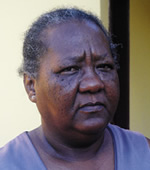 |
Ana Leopoldina dos Santos was born in the Ourucuri (PE) countryside, in 1923. Fleeing from the drought with her family, they ended up in Petrolina, because someone told them there was a river there that never dried up. Until then she had never seen a boat figurehead. “My mother says they came on foot, with a donkey carrying their belongings. They would travel at night and rest during the day because of the heat. That was up to Paulistânia, in Piauí, then they got a train”, remembers Maria da Cruz Santos, daughter of Ana Leopoldina – known as Ana of Carrancas (figureheads) who is very frail because of a recent stroke. Maria da Cruz has became her voice and comfort.
Ana’s mother was a potter, and it was from her that she learned to model clay. She made pieces and sold them at the market. With a busy life, and children to raise, Ana found peace with her second husband. Blind, he helps her prepare the clay as if he could see every inch around him. “My mum used to say she now had a husband with eyes only for her, and not for other women. In his honour, she started piercing the eyes of the figureheads.”
Maria da Cruz says her mother discovered clay and figureheads with divine help. “She says she saw a mussambê tree and told her husband that there would be good place for clay. She took a spade and started digging. The impact created sparks and she thought it was a divine sign. She got on her knees, prayed, and with the first bit of clay she made a figurehead just like one she had seen on an abandoned boat nearby. She took it home to finish it. On the day of the market in Petrolina she placed the figurehead with the pots. People noticed, a crowd gathered and people always bought something. One day some reporters came from Recife, and everything changed.”
Maria da Cruz always accompanies her mother, who made her study. “She used to say that only museums live off art, and that I had to prepare myself. I studied to be a teacher and today work in this venue the local council built for her (Cultural Centre Ana das Carrancas). I also make my sculptures and teach others to work with clay. I prefer human faces and African masks. My mother says my grandfather was from Quilombo dos Palmares (a colony founded by rebel slaves). Maybe that explains it.”
In 1975, in an interview, Ana said: “No one can deny where I’ve laid my hand. Everyone can recognise what I have made”. And she repeats: “My blood is Black but my soul is made of clay” |


